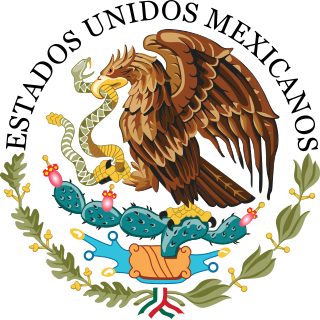| |||||||||||||||||||||||||
| |||||||||||||||||||||||||
| |||||||||||||||||||||||||
States won by the presidential candidates (green for Salinas and yellow for Cárdenas) | |||||||||||||||||||||||||
| |||||||||||||||||||||||||
 |
|---|
| This article is part of a series on the politics and government of Mexico |
Executive |
Legislative |
| Foreign relations |
General elections were held in Mexico on July 6, 1988. [1]

Mexico, officially the United Mexican States, is a country in the southern portion of North America. It is bordered to the north by the United States; to the south and west by the Pacific Ocean; to the southeast by Guatemala, Belize, and the Caribbean Sea; and to the east by the Gulf of Mexico. Covering almost 2,000,000 square kilometres (770,000 sq mi), the nation is the fifth largest country in the Americas by total area and the 13th largest independent state in the world. With an estimated population of over 120 million people, the country is the eleventh most populous state and the most populous Spanish-speaking state in the world, while being the second most populous nation in Latin America after Brazil. Mexico is a federation comprising 31 states and Mexico City, a special federal entity that is also the capital city and its most populous city. Other metropolises in the state include Guadalajara, Monterrey, Puebla, Toluca, Tijuana and León.
Contents
Carlos Salinas de Gortari was declared the winner, with the Ministry of Interior saying he had received 50.7% of the vote. It was the lowest for a winning candidate since direct elections were introduced for the presidency in 1917. [2] In the Chamber of Deputies election, the Institutional Revolutionary Party won 260 of the 500 seats, [3] as well as winning 60 of the 64 seats in the Senate election. [4] Voter turnout was said to be 51.6% in the presidential election, 49.7% for the Senate elections and 49.4% for the Chamber election. [5] This was the first time that a parallel vote tabulation was implemented in Mexico, the results were informed by telephone from the electoral districts to the secretariat of the Interior. During the parallel vote tabulation, the secretary of the interior said that the telephone network was saturated, characterizing it as "a breakdown of the system." [6] Former president Miguel de la Madrid later admitted that this "breakdown" was a fabrication. [7] One observer said, "For the ordinary citizen, it was not the network but the Mexican political system that had crashed." [8] Although early results of the parallel vote tabulation had indicated Cuauhtemoc Cárdenas was winning, when the official results were announced, Salinas was said to have eked out a narrow victory.

Carlos Salinas de Gortari is a Mexican economist and politician affiliated with the Institutional Revolutionary Party (PRI) who served as President of Mexico from 1988 to 1994. He is widely regarded as the most influential politician in Mexico over the last 30 years. Earlier in his career he worked in the Budget Secretariat eventually becoming Secretary. He was the PRI presidential candidate in 1988, and was declared elected on 6 July 1988 after a controversial electoral process and accusations of electoral fraud.

The Institutional Revolutionary Party is a Mexican political party founded in 1929 that held uninterrupted power in the country for 71 years from 1929 to 2000, first as the National Revolutionary Party, then as the Party of the Mexican Revolution, and finally renaming itself as the Institutional Revolutionary Party in 1946.
The Parallel Vote Tabulation (PVT) is an election observation methodology that is typically based on a representative random sample of polling stations and is employed for independent verification of election results. A PVT involves observation of the administration of the election, the process of voting and of counting of ballots at the polling stations, collection of official polling station results and independent tabulation of these results, parallel to election authorities. A PVT is also referred to as a Quick Count.

















